Review: Scott Pilgrim by Bryan Lee O'Malley "an epic series that demands an epic read"
Reviewing all six volumes of the Oni Press epic
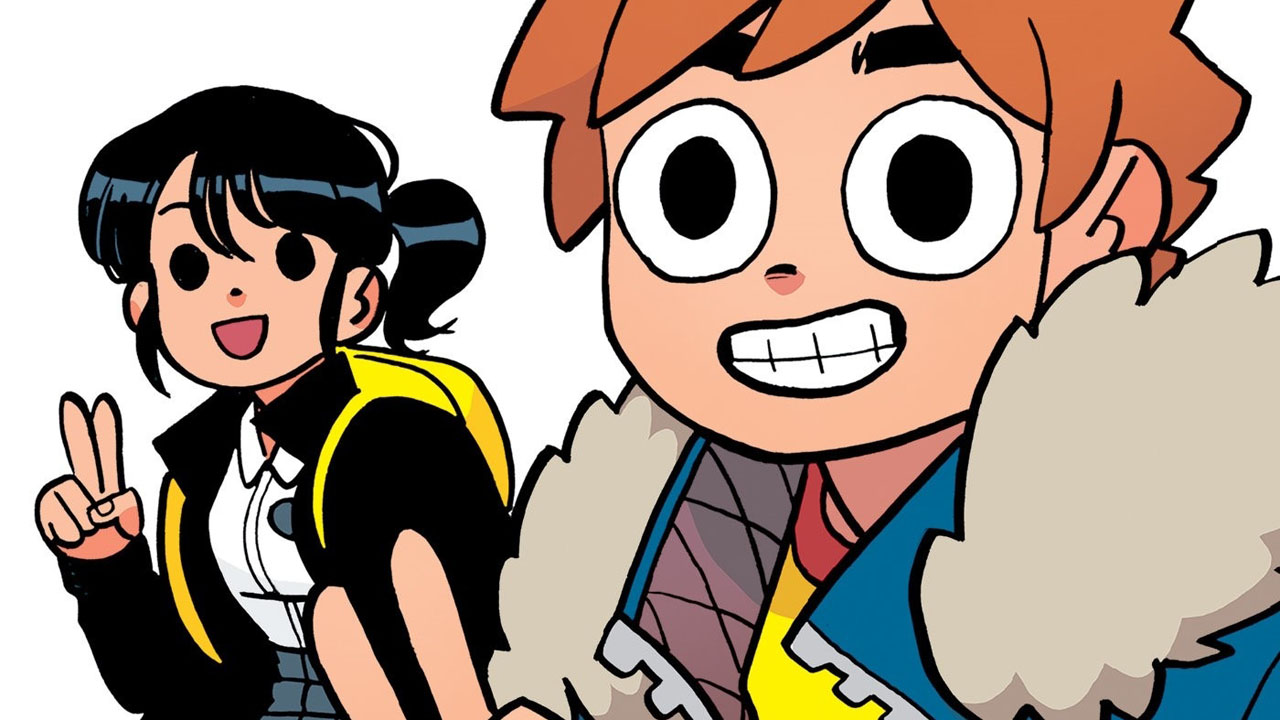
"Scott, if your life had a face, I would punch it in the balls." ~ Stephen Stills, Age 23
Scott Pilgrim is a character that's sometimes hard to describe into words. Sometimes when you read him, he seems like this. Or this. Or even this.
Written and drawn by Bryan Lee O'Malley
Art assists in Vol. 6 by John Kantz and Aaron Ancheta
Published by Oni Press
But no matter how you look at him, or what games you play, it's impossible to deny that Scott Pilgrim is an epic character, with a living, breathing world created by Bryan Lee O'Malley. Looking at the entire six-volume collection of Scott Pilgrim's Epic Adventure is a fascinating study not just in the evolution of a character, but in the evolution of one creator's craft.
That's not to say that O'Malley started with a perfect home run. Ultimately, Scott Pilgrim's Precious Little Life does live up to its name in being a little bit precious with its pacing and its tone - it's got O'Malley's sense of humor, but it doesn't have the in-depth look at Scott. Where O'Malley does succeed, however, is with his characterization in the supporting cast - characters like Wallace and Stephen Stills are instantly recognizable, and Ramona, in particular, is an instantly interesting character from the moment she skates through Scott Pilgrim's subconscious. Where the first book stumbles, however, is with the character of Knives Chau. Knives ultimately weakens the reader's attachment to Scott, because who wants to root for a 24-year-old who dates (and then cheats on) a 17-year-old girl?
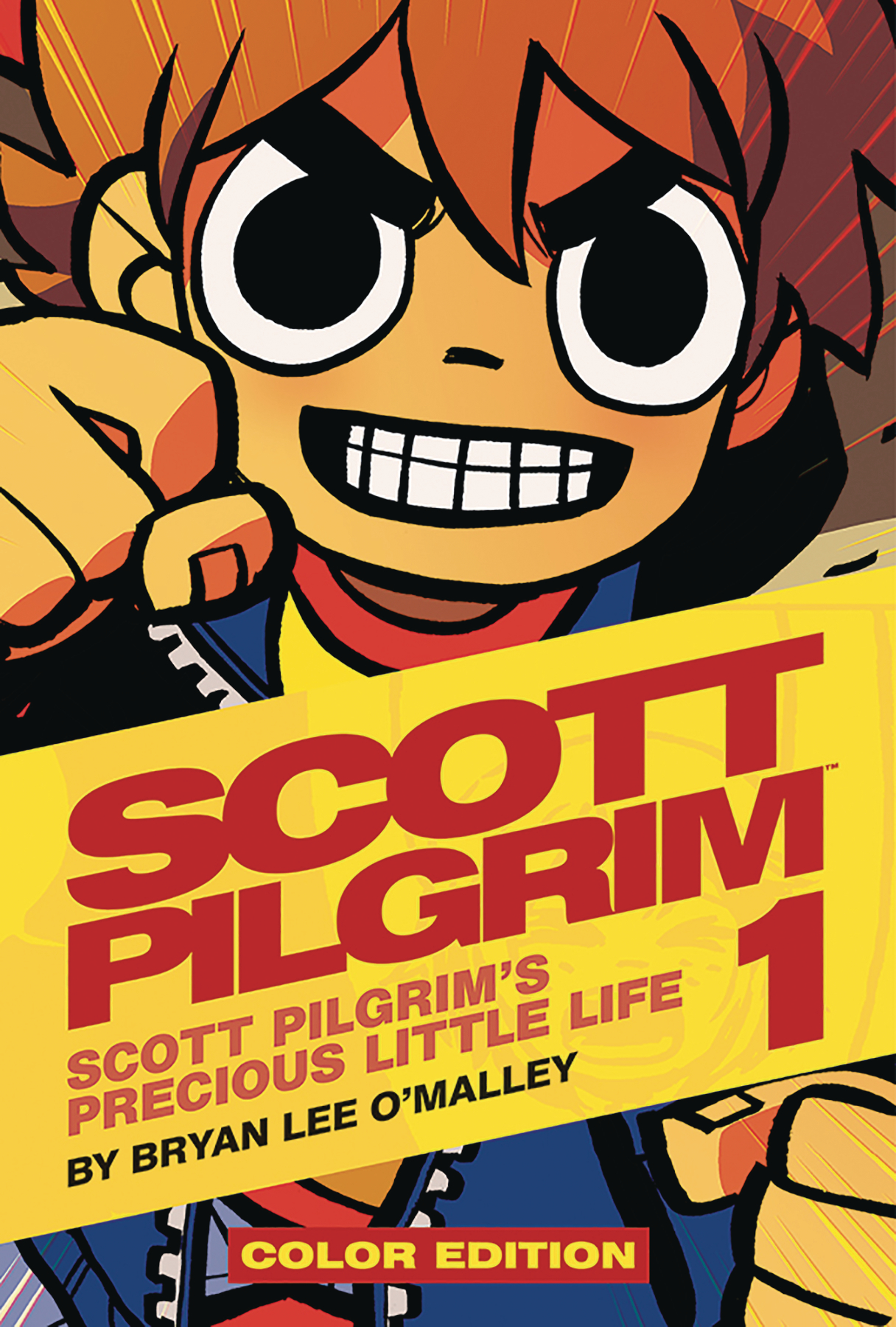
As far as the art goes, it's interesting to see O'Malley himself getting familiar with the cast of characters. Scott Pilgrim himself looks almost more 'realistic' than his later incarnations would go, whereas Ramona isn't as well-defined, her head having the same rounded square look as some of the other characters. But there's a real edginess to O'Malley's linework that you don't see in the later volumes -- in the last pages of the book especially, there's a real punk streak that rolls through the scenes, with tons of lines and a surprising amount of detail architecturally. There's an indie feel to O'Malley's designs, something that's less commercial and more rough and raw, and it's interesting to compare and contrast with later volumes.
But the question that ultimately comes up throughout much of the first volume is - and it's one that can alienate less patient readers - what's the twist? What makes Scott Pilgrim different from all the rest? And just as you're asking yourself that question, the series kicks into overdrive, of course, with the introduction of the League of Ramona's Evil Ex-Boyfriends. Not only does it suddenly pour on the speed and shuttle readers past a particularly uncomfortable plot point with Knives, but it also solidifies the video-game themes to the entire series. Block, punch, reversal - the Evil Exes may be the bane of Scott's existence, but their inclusion in the book defines Scott Pilgrim as something different from all the other indie romance comics of yesteryear.
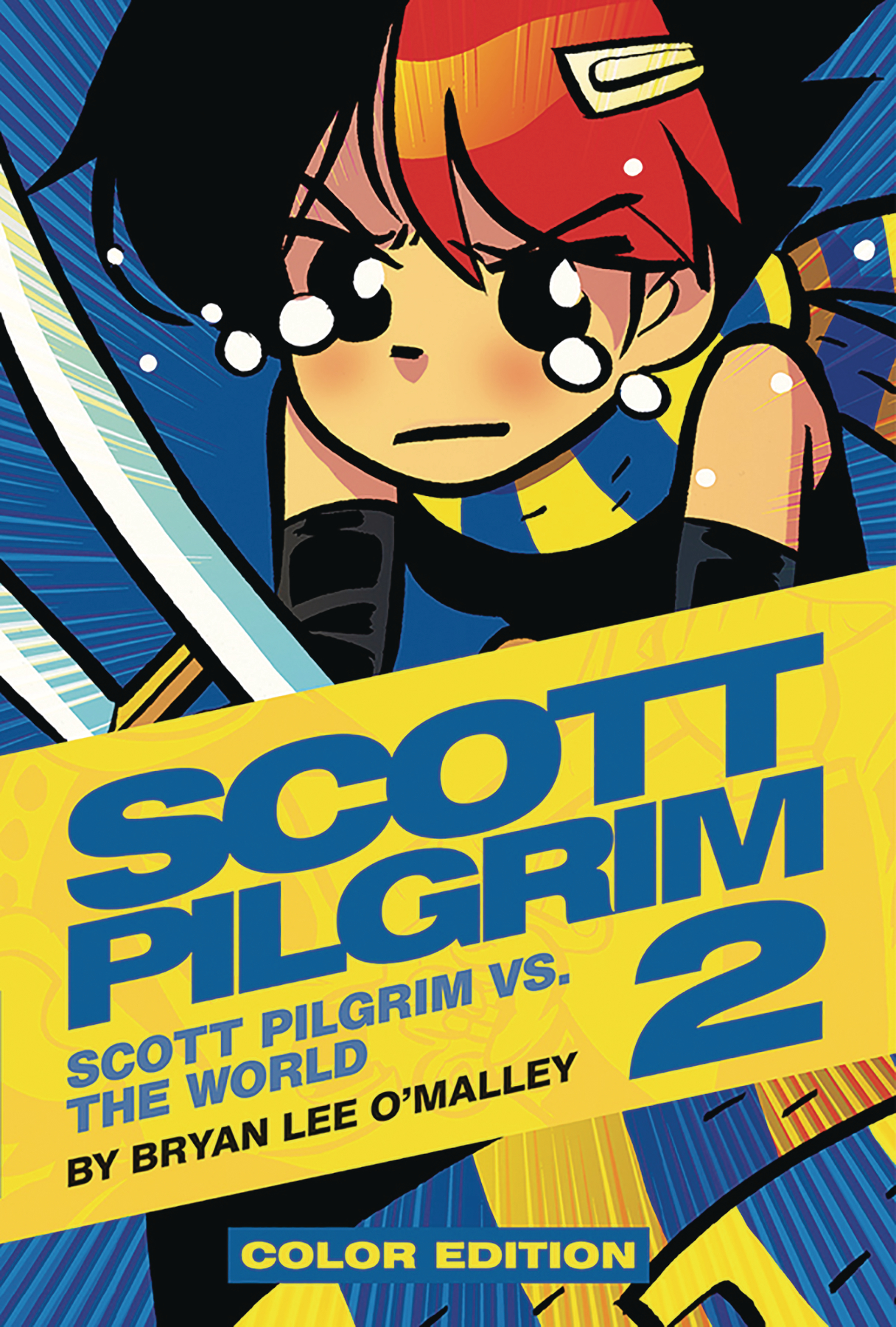
When you hit the second volume, Scott Pilgrim vs. The World, it's not a sophomore slump: it's instead a different angle on the Scott Pilgrim world, with O'Malley taking a holistic look not just at one character, but on his entire world. O'Malley spends a surprising amount of his introduction on the character of Kim Pine, as well as Scott Pilgrim's early days as the master of geek fu - but it definitely makes for some surprisingly compelling reading, one that not only gives Scott depth as a lover and a fighter but shows why Kim is important - and why she might have some unsorted feelings for our hero.
Get the best comic news, insights, opinions, analysis and more!
And O'Malley's desire to innovate also extends to the fight sequences - and while many people were likely hooked into the series based on the strength of the fight at the end of the first volume, O'Malley lets Scott take the personal touch against Lucas Lee. Who says all fights have to be fisticuffs? Chowing down on carrot sticks with a handsome actor is funny enough, while O'Malley's battle between Ramona and Knives both runs fast and has some great one-liners that play off well against O'Malley's increasingly confident linework. "Look at your face! I totally grazed you!!" Knives laughs. "How appropriate. You fight like a cow," Ramona snaps back. Ouch.
Ultimately, the second volume does run a bit slower than the first volume - just like the first volume didn't really get into the high concept of the Evil Exes until late in the volume, this sophomore book focuses more on the supporting characters than necessarily Scott himself - or to be more precise, everyone else's perspectives on Scott - and it's only the reintroduction of Envy Adams that O'Malley really starts to get into the depths of what makes Scott Pilgrim tick. Even though we don't see her face, O'Malley's use of panel composition - of not really looking Scott square on, with us sharing his disorientation - shows that this isn't just a laff riot comedy. There's some real pain underneath those cartoon eyes, an emotional paralysis everyone can understand.

But it's by the third book, Scott Pilgrim & The Infinite Sadness, that O'Malley really hits his stride. There are certain parts of the story architecture that zoom Scott Pilgrim along, not unlike the speed ramps in Mario Kart 64. And one of the key pillars in that story structure has to be Scott's smokin' hot rock-goddess ex-girlfriend, Envy Adams. While it was clear that there was something wrong with Scott in the previous volumes, O'Malley never really got deep enough to signal how deep the sadness really went. We've known what he wants at least on the surface level, but it's only in the third volume that we finally figure out what makes Scott Pilgrim tick. "Can we talk like normal people?" Envy asks. "Nat..." Scott replies, "Did we ever talk like normal people?"
Envy, in many ways, is the hole in Scott Pilgrim's life. She's the car accident you never recover from. She's the best thing that ever happened to Scott - well, best thing until Ramona, anyway - and she'll never, ever let him forget it. But what O'Malley does in the third volume that I think is so compelling is that he makes her downfall organic and methodical - you don't become Envy Adams overnight, you turn into her when your dreams become twisted by ambition, and you lose yourself to the work instead of the love of the game.
And furthermore, things start to pick up as far as the mythology of the series. Well, calling it "mythology" implies that you need to take it seriously - seriously, you don't - but whether it's looking at the telekinetic powers of vegankind or even seeing Wallace pop raindrops off his back with the power of his chi, things start to unlock as far as Scott Pilgrim goes. Just like in the first volume, when Matthew Patel showed us all that this isn't just a love story, Todd Ingram shows us that this isn't just a standard fight comic, either.
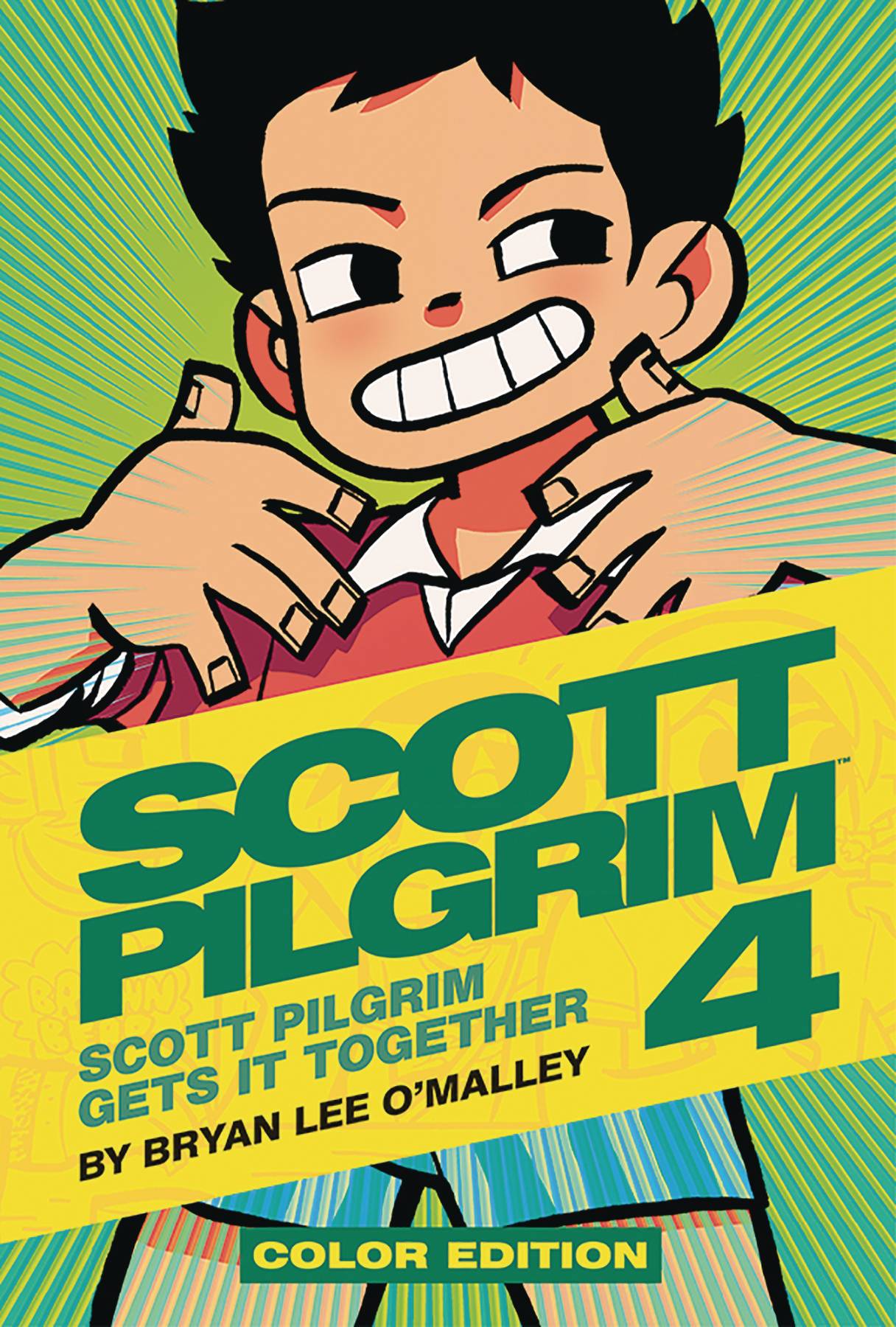
That mythology, that larger-than-life attitude that only love and war can bring, comes to a head in Scott Pilgrim Gets It Together. It's interesting that Bryan Lee O'Malley opens up the fourth book with a hang-out session because, throughout the entirety of the run, he's been building up all of the supporting cast, whether it's Wallace's penchant for picking up guys, Stephen Stills' rocky relationship with Julie, or even Kim Pine's cry for help in the last volume when she told everyone she was "scrapbooking." And something that you don't necessarily pick up at the first glance - you're so distracted by the color and how great it looks - is that Scott Pilgrim has completed his transformation from O'Malley's original, more realistic design to something a bit cartoonier, a bit rounder, a bit more expressive and easy to design.
The fourth volume, just like it says in the title, really is about getting everything together - not just the protagonist's perspective, but the reader's as well. Scott is making his first steps toward growing up - he's getting a job, he's finding his own place, and perhaps most importantly... he's experiencing some doubts about his future with Ramona. It's interesting because on the one hand you're yelling at Scott to not be an idiot, that if he's fought this hard for Ramona she's clearly worth staying on the straight-and-narrow - but on the other hand, it's not like in the first volume, where you were really questioning the morality of the character when he was two-timing Knives Chau. For better or for worse, if you've read the first three volumes of the series, by Volume Four, we're with Scott for the long haul.
Not only that but by this point, you can see that O'Malley is really starting to relax and let loose with his humor. Not that there weren't side-gags and humorous captions in the first three volumes, but the comedy really gets bumped up in a major way. Whether it's Scott crying for Wallace to get him a glass of water, or Scott's reaction to hearing about someone's college experimentations with women ("You had a sexy phase?!"), or even the dumbfounded gleeful nod he gives when he tells Ramona he has a job, there's definitely a lot more laughs as the story has progressed. But there's also some real emotional moments here as well - namely, Scott realizing that he has to get himself together, that he has to put his home and his job and his one true love back in place. It shows that our hero isn't just a one-trick pony - he's more than just the airhead, he's got some heart. Ultimately, I'd say out of any of the books, Volume Four is the highlight of the series - when he finally stands up and says the L-Word -- you feel like you're leveling up with him.
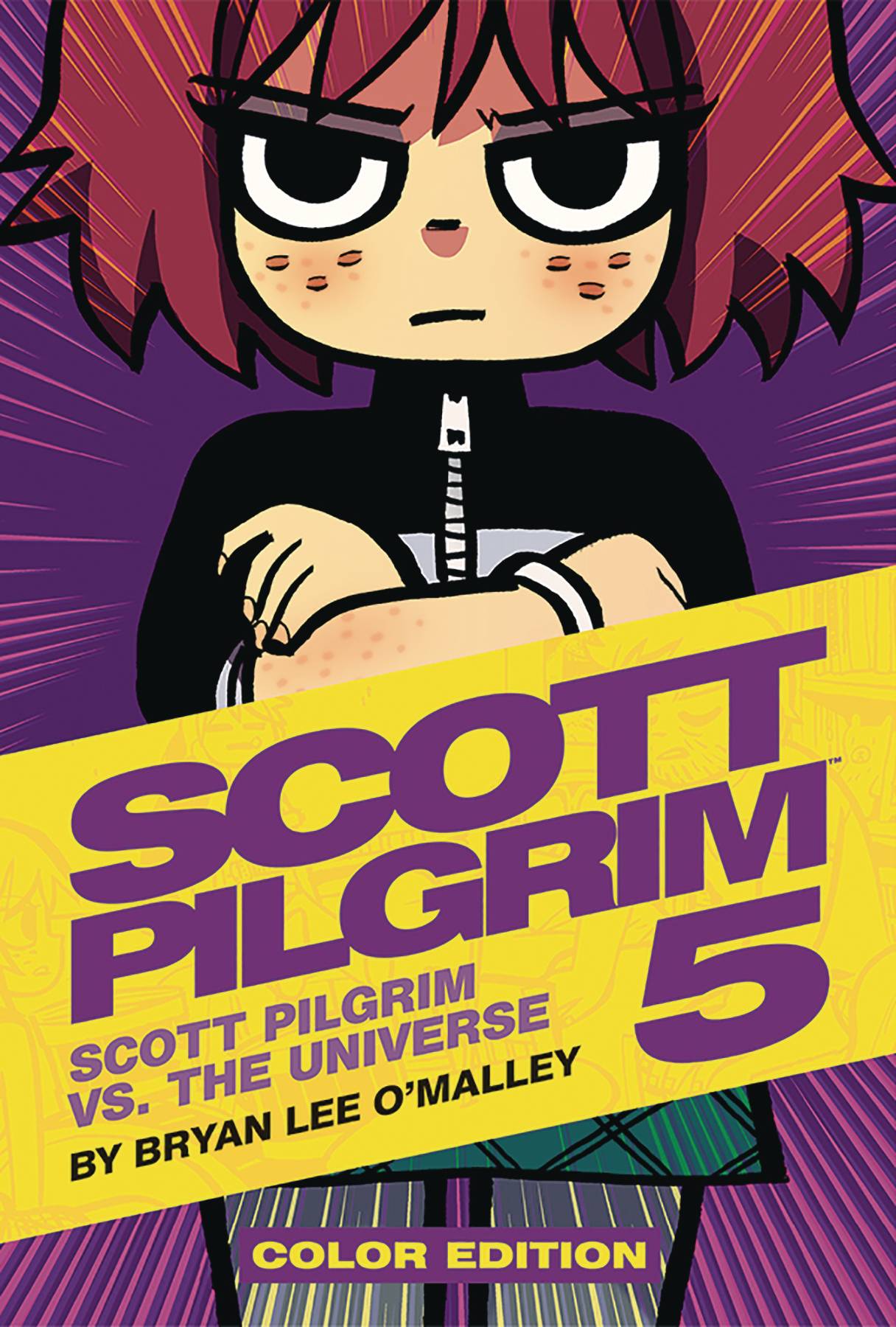
It's that level of success in the fourth volume that, to be honest, I think flat-tires the fifth book, Scott Pilgrim vs. The Universe. In a lot of ways, the fifth volume is all about the chickens coming home to roost - structurally, I understand the need for Scott to hit his lowest point, but it doesn't necessarily add up to me after the victories of the last book.
All those icky feelings you had about Scott and Knives in the first volume, that you finally were able to let go in the last book? Here is where they absolutely explode, as Scott Pilgrim experiences his own personal Empire Strikes Back. But whereas the last volume was about balancing the comedy and the humor, this book has a certain anxiety to it, a real concern that Scott might not come out of this in one piece. Just one page alone shows the potential for calamity, when Scott wakes up after a fight with Ramona: "No Ramona," an arrow points to the bed. "No heartbeat," replies an arrow pointing at Scott.
Ultimately, however, this is the one issue that, while it fulfills a necessary structural role in the Scott Pilgrim saga, it also feels like it adds the least to the overall world. That's not to say there isn't any craft here - Ramona's departure is absolutely heartbreaking, and who'd have thought a pixelated "Continue?" would seem so morose - but ultimately, the Twins didn't add so much to the overall story, and ultimately the fallout from Knives' admission doesn't feel as defined, as enwrapped in the characters as every other story beat has been. But as Ramona fades into the distance -- enigmatically telling Scott "I had fun" -- it's a clear cliffhanger that's meant to bring you onboard for…
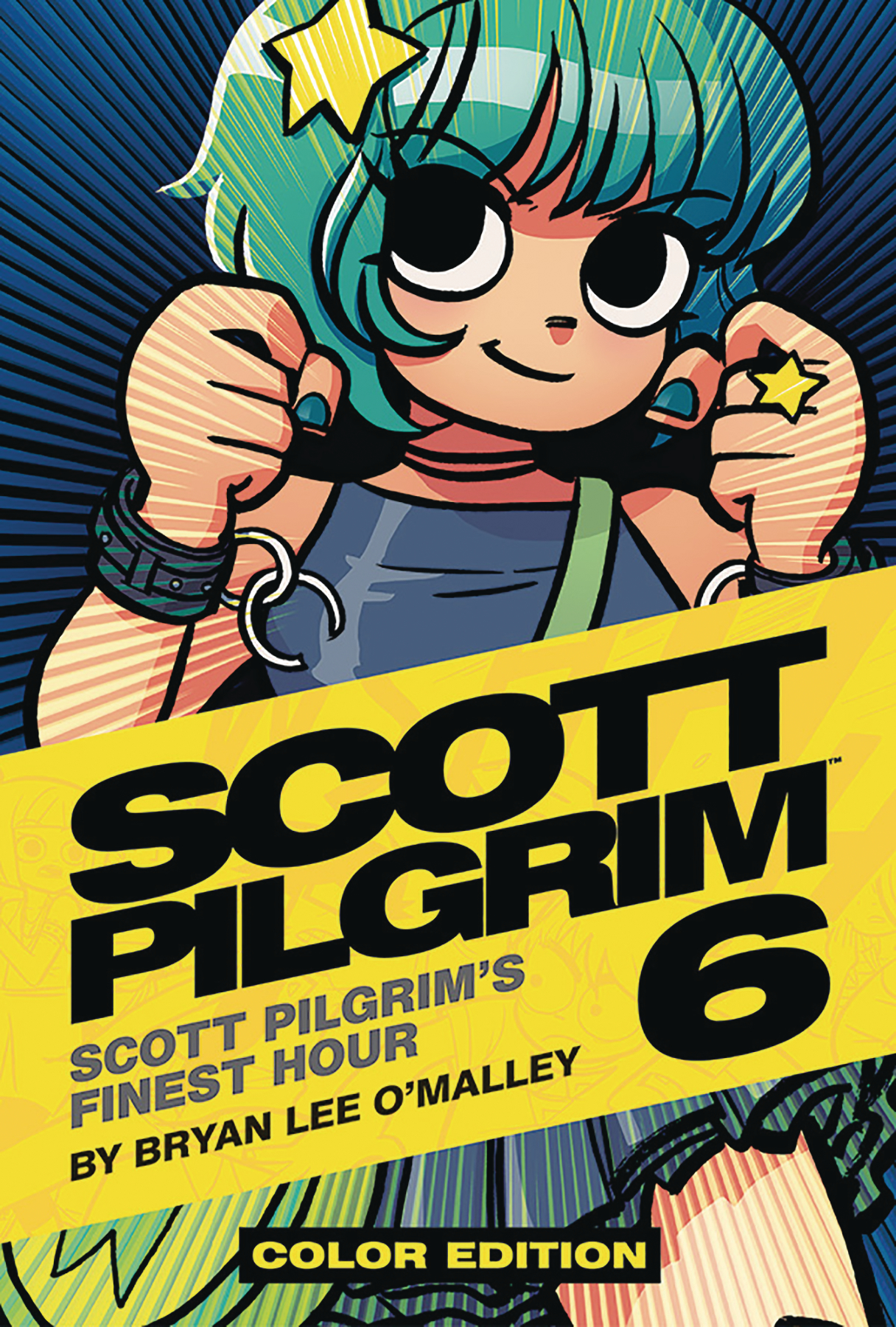
Scott Pilgrim's Finest Hour. And if you didn't believe us when we've said it before, I'll reiterate: This book absolutely lives up to its name. Just from the get-go, something's changed with Bryan Lee O'Malley. And I'm not talking about his two art assistants. He's clearly leveled up his game, setting up themes, imagery, showing that Scott Pilgrim is a fly pinned to the dissection board of love, as he's dissected by his own regrets and loneliness. His art has transitioned into full-on Cartoon Network mode, but to be honest, that only allows him to up his expressiveness.
What's perhaps the most surprising thing about Scott Pilgrim's Finest Hour is its structure. For a book that you would think would be jonesing for Scott Pilgrim's Final Battle, it's almost halfway through the book before the epic battle royale begins. Instead, O'Malley spends his time pulling together loose threads, bringing together Scott's worst enemies and greatest fears, and doing what so many actioners flitter away with gunshots and explosions: O'Malley gives them meaning. Every villain is the hero of their own story, and not only does the Final Boss have a true sense of power - a sense of power that, surprisingly, has been eluded to subtly in almost every preceding volume - but Scott wins out not just by force, but by defeating him emotionally. Breaking up is hard to do, and there's a little bit of the Evil Exes in every one of us. And without giving too much away, let me say this: O'Malley manages to pull Scott from the jaws of defeat with a classic video game item that made me cheer out loud when I saw it. Bonus score indeed.
Ultimately, it's an epic series that demands an epic read. Scott Pilgrim isn't your standard superhero fare, your grim-and-gritty high-concept book, or even your high-brow indie autobio-comic. It's a love story, yes, it's an action story, yes, it's a six-book homage to ennui and dreams and the best damn video games of our generation. There's no capes-and-tights or epic muscles, it's a cartoon adventure that evokes some of the slickest mangaka with hipster pop culture. It may not be for everyone, but it is a book that demands a read. It's structurally a rock-solid story-arc - an achievement in and of itself, considering the six books have been six years in the making - and to be honest, this is a hero who can do anything. He's a rock star. A romantic. A fighter. A last bastion of the all-powerful L-Word - and I'm not talking about lesbians.
Take the plunge into the unknown - you won't regret it. After all, he's Scott Pilgrim. And he's a critical hit.
David is a former crime reporter turned comic book expert, and has transformed into a Ringo Award-winning writer of Savage Avengers, Spencer & Locke, Going to the Chapel, Grand Theft Astro, The O.Z., and Scout’s Honor. He also writes for Newsarama, and has worked for CBS, Netflix and Universal Studios too.


